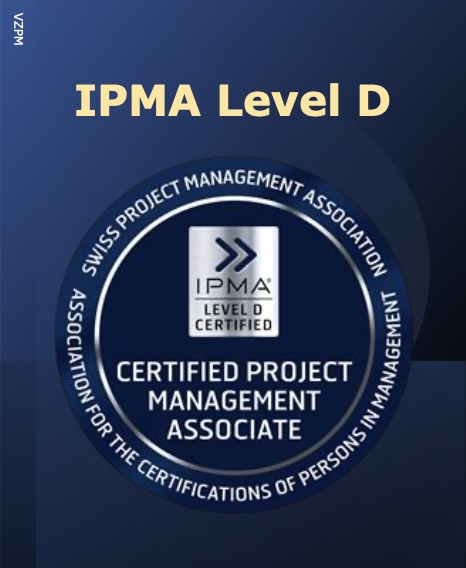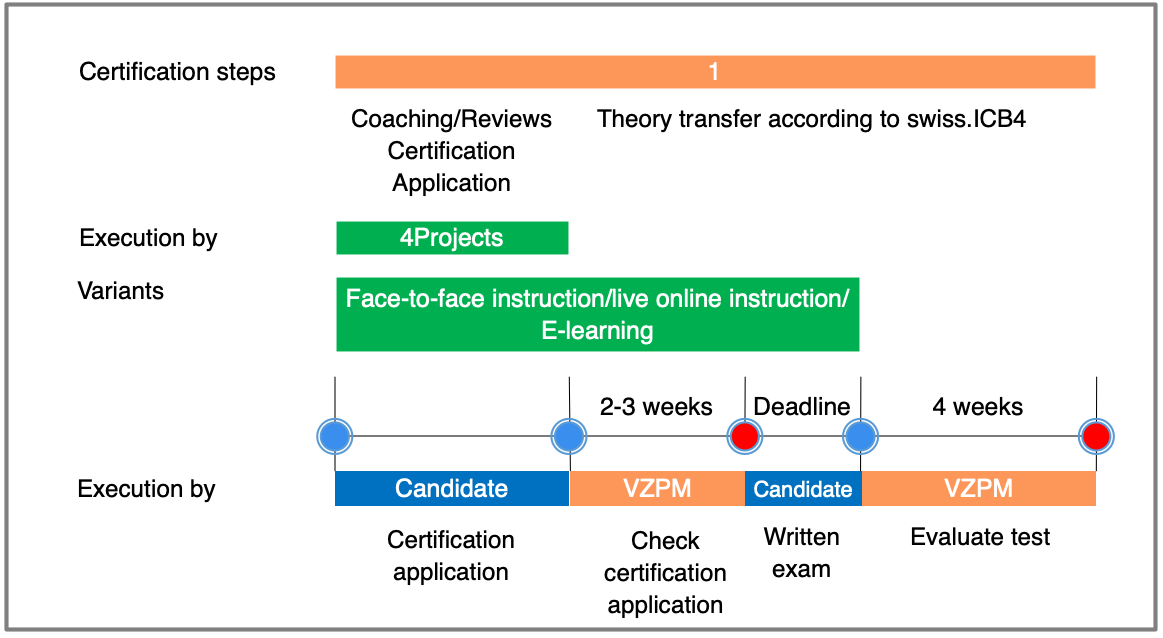
Information on our course
Kick-start your project management career with a recognised qualification.
The language used in the courses is English.
Our “Project Management Fundamentals – IPMA Level D” course provides practical knowledge and specific preparation for IPMA certification in Switzerland.
The internationally recognised IPMA title, 'Certified Project Management Associate IPMA Level D', will strengthen your profile as a project manager and create new career opportunities for you.
Begin your project management training with 4Projects today and secure your IPMA Level D certification — the Swiss specialists in practical project management training.
Course options and fees

E-Learning
Course fees: CHF 2750.-
Duration: individual
In the e-learning course, you can learn flexibly and at your own pace—without having to stick to a fixed schedule. If you have any questions, your personal coach is always there to help.

Individual coaching
Course fees: CHF 4600.-
Duration: individual
In individual coaching, you benefit from a learning plan tailored to your learning pace and personal support from your coach. The virtual meetings enable flexible and targeted preparation for your learning goals.
You will receive a discount on the course fees if at least two participants from the same company register for the same course variant. The evening course is excluded from this discount. Certification fees are not included in the course fees.
Certification fees are not included in the course fees. These include the following certification steps from the VZPM:
- Certification application/self-assessment
- Written examination IPMA® Level D written exam
| Certification fees | |
| Certification fees for employed and unemployed persons | CHF 900.- |
| Certification fees for job seekers (RAV, IV), students, candidates subject to the collective labor agreement for temporary staffing | CHF 440.- |
Course dates IPMA Level D
Reasons to attend a course at 4Projects
Trust our team with over 25 years of training and coaching experience and more than 900 certified graduates. 98% of our participants have successfully earned their certification.
- Officially recognized project management training in Switzerland.
- Efficient course structure – ideal for working professionals.
- Although the subject matter is complex, it is taught in a way that is both understandable and exciting thanks to its structure and practical examples.
- The coach also answers questions about theory and practice outside of course hours.
- Small classes: Six to twelve participants are guaranteed for successful learning.
- The course content is up to date and covers all ICB4 competency elements.
- You will receive a knowledge database and a project management compendium with over 800 pages of text, illustrations, and tables in PDF format. You can use the PDFs indefinitely, including during the written exam.
- Audio and interactive content help you understand the material better.
- You will also receive tried-and-true templates and tools for your own use.
- The e-learning option includes individual support: video sessions with a coach upon request.
- Exam training is based on sample exams from previous years (PDF).
- There is a network of experienced project managers, Scrum Masters, and product owners.
IPMA® certification is internationally recognized and often associated with more responsibility and a salary increase.
The IPMA® level at which you become certified depends on your experience. No experience is required for IPMA® Level D certification.
IPMA® Level D certification process
The following figure illustrates the IPMA® Level D certification process. It lists the individual certification steps and their deliverables, as well as the services provided by 4Projects, the certification body (VZPM), and the candidates.
The language used in the courses is English. Candidates can select English, German or French for the certification process, written exam, and certificate language.
Course contents and objectives
The course content is based on the official IPMA® standard and covers all 28 elements of competence. The focus is on project implementation methodology.
Competence area Practices
Project launch, goal definition, time and cost planning, risk management, stakeholder management, quality management, controlling
| Competence element | You are able to... |
| Project design | draw up a basic plan of action for the project right at the beginning, |
| Requirements and objectives | define and prioritize requirements and objectives, |
| Scope | define the scope of services and determine the deliverables, |
| Time | select and adapt an appropriate project management process model, creating and adapting a schedule and deadline plan, |
| Organization and information | establish a project information and documentation system, |
| Quality | establish a quality management system, |
| Finance | plan and manage a project in terms of costs and financing, |
| Resources | planning, procuring, and deploying resources, |
| Procurement | negotiate with suppliers, |
| Plan and control | create and implement a project control system, |
| Risk and opportunity | plan and implement risk and opportunity management, |
| Stakeholders | deal with affected parties and stakeholders to ensure the project is accepted successfully, |
| Change and transformation | sell the project not only functionally, but also psychologically to achieve greater acceptance among those affected and involved. |
Competence area People
Communication, teamwork, motivation, self-management, conflict management
| Competence element | You are able to... |
| Self-reflection and self-management | reflect and manage yourself, |
| Personal integrity and reliability | build integrity and reliability for yourself and within the project team, |
| Personal communication | communicate appropriately, |
| Relationships and engagement | build a network of relationships, |
| Leadership | lead oneself and others successfully, |
| Teamwork | build an interdisciplinary and high-performance team, |
| Conflict and crisis | be prepared for conflicts and crises, and learn how to deal with them successfully, |
| Resourcefulness | think and act holistically, |
| Negotiation | negotiate successfully, |
| Result orientation | work in a results-oriented manner. |
Competence area Context (Perspective)
Corporate strategy, governance, sustainability, project culture
| Competence element | You are able to... |
| Strategy | apply strategy, structure, and culture to your project, |
| Governance, structures and processes | identify the existing management structures and processes, then manage your project accordingly, |
| Compliance, standards and regulation | identify the existing rules, standards, and regulations, and apply them to your project, |
| Power and interest | identify the company's power and interests and use them for the project, |
| Culture and values | recognize culture and values, and align project management accordingly, practicing sustainability in project management and solutions. |
Requirements and performance measurement
No project management experience is necessary. A high school diploma or vocational qualification is not necessary.
The certification rounds are conducted by the Association for the Certification of Persons in Management (VZPM). The three-hour written exam consists of a section on basic knowledge with multiple-choice questions and a section with open questions.
You will prepare for the exam by taking practice and sample exams based on past exams. The exam questions will be similar in structure to the current exams. Your coach will answer any questions you have about the exam and help you pass.
Graduation

After the course, proof of achievement is available in the form of recognized and well-known certifications. By passing the certification process for the relevant certification, you are entitled to use the following title:
Certified Project Management Associate IPMA® Level D
Projektassistent IPMA® Level D
Related designations: Project Manager, Project Assistant, Project Management Specialist, PMO Manager, Global Project Management Officer, Project Management Officer (PMO)
Advantages of IPMA® Certification
Our training courses are recognized by the Association for the Certification of Persons in Management (VZPM) and count toward IPMA® recertification.
Our continuing education courses provide structured preparation for IPMA® certification, which is recognized internationally and is industry-neutral. Our participants work in a variety of industries and professions, which enriches the courses with diverse experiences.
IPMA® certification can help advance your career, increase project success rates, and improve customer satisfaction. It offers a number of advantages for individuals and companies.
For individuals:
- Higher salary: Studies show that certified project managers earn higher salaries on average than non-certified managers.
- Better career opportunities: Certification can help you stand out from the competition and improve your chances of getting a new job or promotion.
- Certification can also give you more confidence in your everyday project work. Certification boosts your confidence and allows you to perform your tasks more competently and efficiently.
- Personal development: Preparing for and taking the certification exam contributes to your personal development in project management.
For companies:
- More efficient project management: Certified project managers are generally more efficient and effective.
- Higher quality project results: Applying best practices in project management generally improves project results.
- Lower project risks: Certified project managers are better able to identify and minimize risks.
- Improved communication and collaboration: Using standardized methods and processes improves communication and collaboration within the project team.
Trainer & coach


Andreas Brauchle
Trainer, Senior Coach & Project Manager
+41 62 875 10 00
andreas.brauchle@4projects.ch
